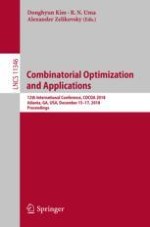2018 | OriginalPaper | Buchkapitel
Super-Stability in the Student-Project Allocation Problem with Ties
verfasst von : Sofiat Olaosebikan, David Manlove
Erschienen in: Combinatorial Optimization and Applications
Aktivieren Sie unsere intelligente Suche, um passende Fachinhalte oder Patente zu finden.
Wählen Sie Textabschnitte aus um mit Künstlicher Intelligenz passenden Patente zu finden. powered by
Markieren Sie Textabschnitte, um KI-gestützt weitere passende Inhalte zu finden. powered by
Abstract
 ) involves assigning students to projects based on student preferences over projects, lecturer preferences over students, and the maximum number of students that each project and lecturer can accommodate. This classical model assumes that preference lists are strictly ordered. Here, we study a generalisation of
) involves assigning students to projects based on student preferences over projects, lecturer preferences over students, and the maximum number of students that each project and lecturer can accommodate. This classical model assumes that preference lists are strictly ordered. Here, we study a generalisation of
 where ties are allowed in the preference lists of students and lecturers, which we refer to as the Student-Project Allocation problem with lecturer preferences over Students with Ties (
where ties are allowed in the preference lists of students and lecturers, which we refer to as the Student-Project Allocation problem with lecturer preferences over Students with Ties (
 ). We investigate stable matchings under the most robust definition of stability in this context, namely super-stability. We describe the first polynomial-time algorithm to find a super-stable matching or to report that no such matching exists, given an instance of
). We investigate stable matchings under the most robust definition of stability in this context, namely super-stability. We describe the first polynomial-time algorithm to find a super-stable matching or to report that no such matching exists, given an instance of
 . Our algorithm runs in O(L) time, where L is the total length of all the preference lists. Finally, we present results obtained from an empirical evaluation of the linear-time algorithm based on randomly-generated
. Our algorithm runs in O(L) time, where L is the total length of all the preference lists. Finally, we present results obtained from an empirical evaluation of the linear-time algorithm based on randomly-generated
 instances. Our main finding is that, whilst super-stable matchings can be elusive, the probability of such a matching existing is significantly higher if ties are restricted to the lecturers’ preference lists.
instances. Our main finding is that, whilst super-stable matchings can be elusive, the probability of such a matching existing is significantly higher if ties are restricted to the lecturers’ preference lists.